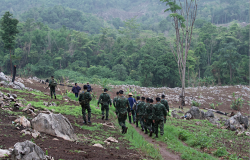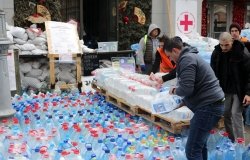New Kids on the Bloc: Chinese State Oil Companies
Wilson Center Public Policy Scholar Jill Shankleman says Chinese state oil and mining companies have started to think about social responsibility as integral to long-term success and have begun implementing programs to help local communities affected by oil and mineral exploration.
In 2006, Jill Shankleman, formerly a senior environmental and social specialist at the World Bank, examined the impact of oil companies in conflict-prone areas, primarily focusing on Azerbaijan, Angola, and Sudan. She found that many companies can and do limit the social and environmental damage from oil and mining. But such efforts usually are not enough to mitigate conflicts associated with oil, which generally derive from how governments use [and abuse] oil revenues.
Now a consultant to international mining companies and a Wilson Center public policy scholar, Shankleman is working on a new study, focusing on how Chinese state oil and mining companies address corporate social responsibility and govern resource wealth. Until 1993, China had sufficient resources to cover its needs and export oil, but now its needs have multiplied exponentially, and China has become an oil and mineral importer. China's risks of buying oil and mining concessions from developing countries are similar to concerns companies have in the West: effects on the community, environmental degradation, and political obstacles, especially in areas prone to conflict or where governments are weak.
Shankleman said Chinese companies are starting to think about social responsibility as necessary to long-term success. In the developing countries where they plan to explore and extract, Chinese companies are paying more attention to understanding local communities and to developing benefits programs to avoid the negative impacts of mining and threats to their operations. However, Shankleman said, it is a slow process.
"I argue that Chinese companies are beginning to adopt the same approach—slowly—as the big Western companies to deal with [developing] communities," said Shankleman. "These companies are just on the cusp of adopting risk and impact assessment techniques and under pressure to raise their standards."
Western companies tend to do most extractive production outside their home countries and focus on potential problems they might create in the developing nations where they are mining. But, Shankleman said, Chinese companies do most of their production in China, so problems in China—policies, environmental damage—drive their approach. "What they're doing abroad relates to pressures in China," she said.
But now China is beginning to implement international environmental standards. For example, the first Chinese bank recently adopted the World Bank's International Finance Corporation Social and Environmental Performance Standards.
During the most recent Party Congress in November 2007, "The Chinese government told these oil companies to be profit-making but, while economic development is a focus, they should be consistent with protecting people and the environment," she said. "This reflects a big shift." This reveals that the Chinese government recognizes that environmental damage is a serious political problem in China, with major financial and health costs, and has begun to take action. However, they remain quite disconnected from the efforts to bring transparency to the size and use of government revenues from oil and mining in resource-rich countries.
Related Program

Environmental Change and Security Program
The Environmental Change and Security Program (ECSP) explores the connections between environmental change, health, and population dynamics and their links to conflict, human insecurity, and foreign policy. Read more










